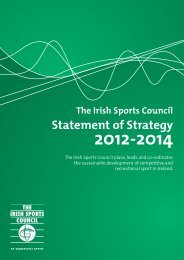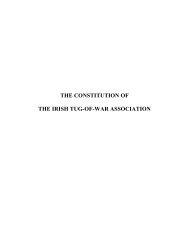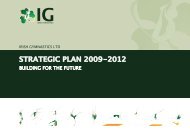Strategic Planning Guidelines - The Irish Sports Council
Strategic Planning Guidelines - The Irish Sports Council
Strategic Planning Guidelines - The Irish Sports Council
You also want an ePaper? Increase the reach of your titles
YUMPU automatically turns print PDFs into web optimized ePapers that Google loves.
Managing Change<br />
Key Principles<br />
“Where there’s a will, there’s a won’t” (Gaultieri’s Law of Inertia)<br />
Arthur Block, Murphy’s Law Book Three: Wrong Reasons Why Things Go More<br />
Whatever approach a particular NGB takes to the preparation of its strategic plan, there<br />
are a number of key principles it should bear in mind from the start.<br />
“<strong>The</strong> business that is not being purposefully led in a clear direction which is understood<br />
by its people is not going to survive”<br />
Sir John Harvey-Jones, Making it Happen: Reflections on Leadership<br />
First, the leadership of the NGB has to be committed to the planning process and the<br />
eventual plan right from the outset. If they sit on the fence until it is finished, and then<br />
pick and choose the bits they like, the plan is probably doomed. It’s also the case that if<br />
there is no commitment to the plan from the start, those in positions of authority may feel<br />
they don’t have to argue their case fully during the planning process because they can<br />
tinker with the final plan later.<br />
Second, the process must be an inclusive one, which involves all key stakeholders<br />
including the membership. Canvassing the views of partners and members and involving<br />
them in key decisions can be difficult and people may have difficulty in making<br />
constructive suggestions for the future. This is particularly the case when clubs and other<br />
stakeholders doubt that real change is about to happen. If all the elements of the NGB<br />
can be persuaded that a strategic plan really will deliver the proposed outcomes this<br />
suspicion can be overcome.<br />
NGBs have responsibilities relating to the general development of sport amongst current<br />
non-participants. <strong>The</strong>se guidelines have already emphasised the importance of working<br />
in partnership whenever possible. Potential partner agencies (sponsors, private facility<br />
operators, etc) can be regarded as NGB “stakeholders”: what they do will affect, or be<br />
affected by, the work of the NGB. <strong>The</strong>refore it makes sense to bring them into the<br />
process, particularly as they can also offer a useful external perspective and different<br />
experience. <strong>The</strong> more that an NGB can base its planning on wide consultation the better.<br />
“Any organisation, which has been through an effective planning process can throw away<br />
its plan because everyone should know what is in it, why and be keen to implement it.”<br />
American management guru Tom Peters<br />
2<br />
12

















